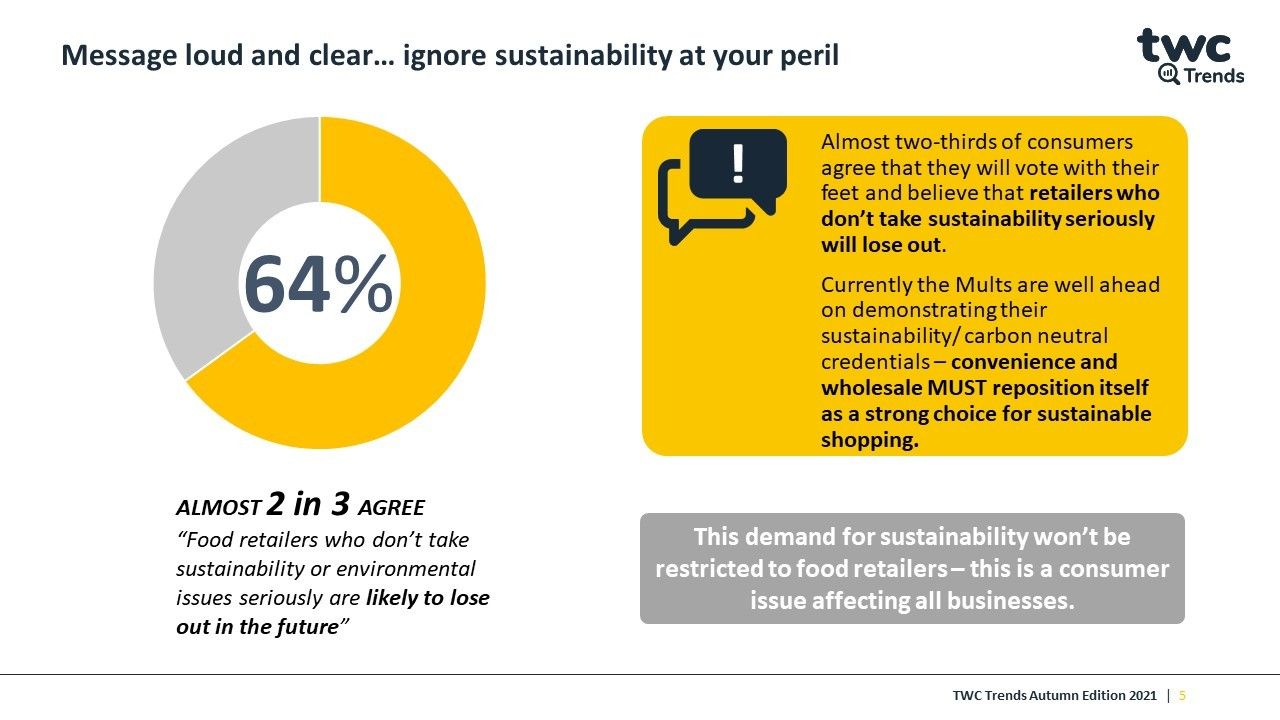Over a third of consumers believe that shopping at convenience stores is better for the environment, states a new report, which also stated that sustainability concerns are already influencing where they are shopping for groceries – and will do so more in the future.
According to TWC Trends “Do good, feel good” report, over 70 percent of consumers are concerned about environmental and sustainability issues. Whilst the youngest cohort, Gen Z (aged 18-24) were most likely to ‘strongly agree’ with this statement, overall agreement (‘agree’ + ‘strongly agree’) was highest amongst Boomers (aged 55+). Boomers were also more likely to consider themselves more concerned about environmental issues that they were three years ago, suggesting that older consumers are ‘catching up’ with their younger counterparts in terms of concerns about sustainability.
What is also clear from the report is that sustainability concerns are already affecting where consumers shop. Over four in ten respondents agreed with this statement – and almost half said that it will be an even greater influence in the future.
Sarah Coleman, Communications Director at TWC comments, “This is a really important issue for consumers and one that is going to rise in importance or possibly become an expectation. Almost two-thirds of consumers agreed that food retailers who don’t take sustainability or environmental issues seriously are likely to lose out in the future – this is a big watch out for all businesses.”
Currently consumers are unsure of the environmental impact of shopping at c-stores, with an equal split between those who agree it is better for the environment (35 percent), those that disagree (33 percent) and those that are unsure (32 percent). Whilst commonly visited on foot; supporting the local economy and in some cases local suppliers; and smaller baskets tending to mean less waste; there is also an awareness of the logistics of delivering to a network of small stores as a less positive aspect of shopping at convenience stores.
“Currently we see the grocery mults are well ahead on demonstrating their environmental credentials and therefore convenience and wholesale must reposition itself as a strong choice for sustainable shopping. Of course, key to this will be identifying which elements of sustainability are most relevant and important to their customers and aligning their communications accordingly,” comments Coleman.

“There is an opportunity here to talk up the environmental benefits of shopping at convenience stores. For example, walking to store (both customers and staff) and collaborations with local businesses that drive the local economy. We believe this would really resonate with consumers.”
“However, we also have to recognise the challenges of implementing sustainability initiatives – whether that is for example the investment required to fit energy efficient chillers or lighting or offering a range of locally sourced produce. By their very nature, local lines from small suppliers are not going to deliver volume and so these demands can be at odds for the retailer and wholesaler. Range recommendations must therefore balance core lines, plus more, to meet this increasing need.”
This research on “Do good, feel good” is the fourth and final part in a series of new mini reports from TWC Trends. The TWC Trends Autumn Edition 2021 series is based on the views and sentiments of over 1,000 consumers across the UK. The research was conducted between 5-8 November 2021.
The TWC Trends Autumn Edition 2021 can be found here: https://twcgroup.net/twc-trends-autumn-edition-2021-part-4/










 To use this website you must be aged 18 years or over. Please verify your age before entering the site.
To use this website you must be aged 18 years or over. Please verify your age before entering the site.























